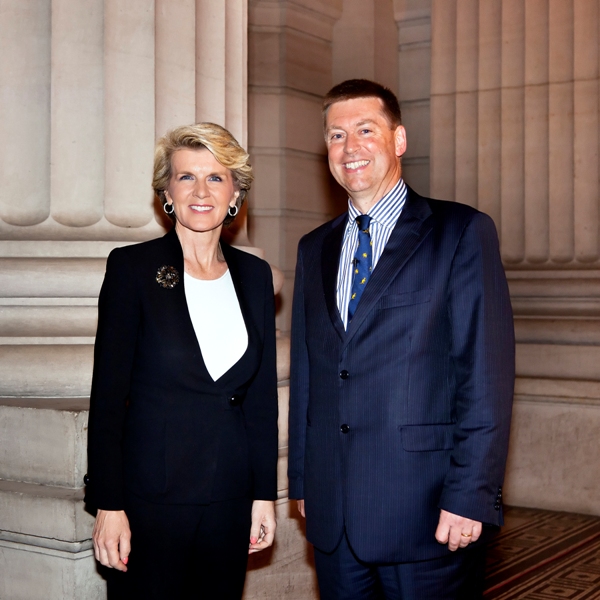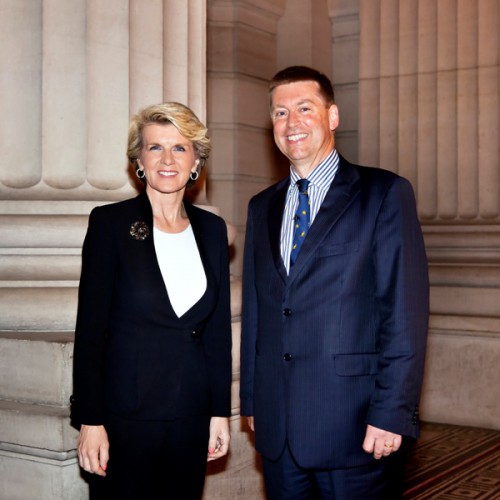1st May 2014
Magna Carta and the "Golden Thread for Economic Development"

“The authors of the Magna Carta clearly recognised the interdependence between personal freedom and economic freedom” said Foreign Minister Julie Bishop as she began her speech at the annual Magna Carta Lecture, which the British High Commission hosts. Before a packed audience at the Victoria State Parliament, she set out her new development paradigm, for harnessing the private sector in assisting economic development.

In my opening remarks I described how British Prime Minister David Cameron has talked about a “golden thread” of things which countries have to get right, to promote economic growth: strong institutions, accountable governments, the rule of law. Just the kind of things, in fact, highlighted in the Magna Carta back in 1215, almost exactly 800 years ago.
As we all know from school, the Magna Carta or “Great Charter” was a document which the barons forced King John to sign, limiting his powers and making clear that no-one, not even a king, was above the law. It has often been described as the greatest constitutional document of all time. Many subsequent important documents like the American Declaration of Independence acknowledge their debt to the Magna Carta. It enshrines some of the basic principles on which the rule of law is founded. Many would argue it laid the basis for the development of capitalism, the industrial revolution and the early economic success of the West. An economic success which, of course has now been repeated in many parts of the world, with 700m people being lifted out of extreme poverty in the last 20 years alone.
But another 1.2 billion people are still living in extreme poverty, without access to thing we all take for granted like drinking water, electricity, healthcare and schooling for children. Countries like Australia and Britain are committed to doing something about that. The UK is the second largest aid donor in the world, and the British government has maintained its aid budgets at a time of public spending cuts. There is still an important role for traditional aid, providing disaster relief and tackling killer diseases like polio and malaria. But increasingly the focus is on promoting economic development.
And that means getting the institutional framework right. In the absence of sound legal systems and good governance, you get corruption and insecurity. Circumstances which make it much less likely that the private sector is going to want to invest in creating strong, growing businesses. So Britain’s Department for International Development is helping to make the operating environment for businesses simpler, fairer and more transparent, through projects that strengthen the legal, regulatory and institutional frameworks in developing countries. We are working with business and with professional institutions like the accountancy bodies.
Businesses recognise that it is in their own interests to promote high corporate standards within their organisations too. Not just because it is the right thing to do. But because decent opportunities for workers and the communities in which they operate helps support the long-term resilience of global supply chains. British and Australian companies in the extractives sector, many of whom are prominent players in poorer developing countries, are playing a key role in supporting efforts towards higher employment standards and greater tax transparency in such countries. Last year the British government launched an action plan on business and human rights, setting out clear expectations for corporate behaviour, in line with guiding principles established by the UN.
The Magna Carta wasn’t perfect. In practice the barons were only seeking improved treatment for nobles and freemen, not for the serfs who made up the majority of the population. But it was a start, and on that foundation has been built a body of domestic and international law which asserts the rights of all men and women. That may still seem a distant prospect to many in the poorest countries. But the British and Australian governments, together with their private sectors, are working to help build the institutional and economic frameworks which can help spread freedom and prosperity.
After her lecture Julie Bishop fielded questions from a very engaged audience, and then joined me for a private dinner with a group of business leaders and journalists.